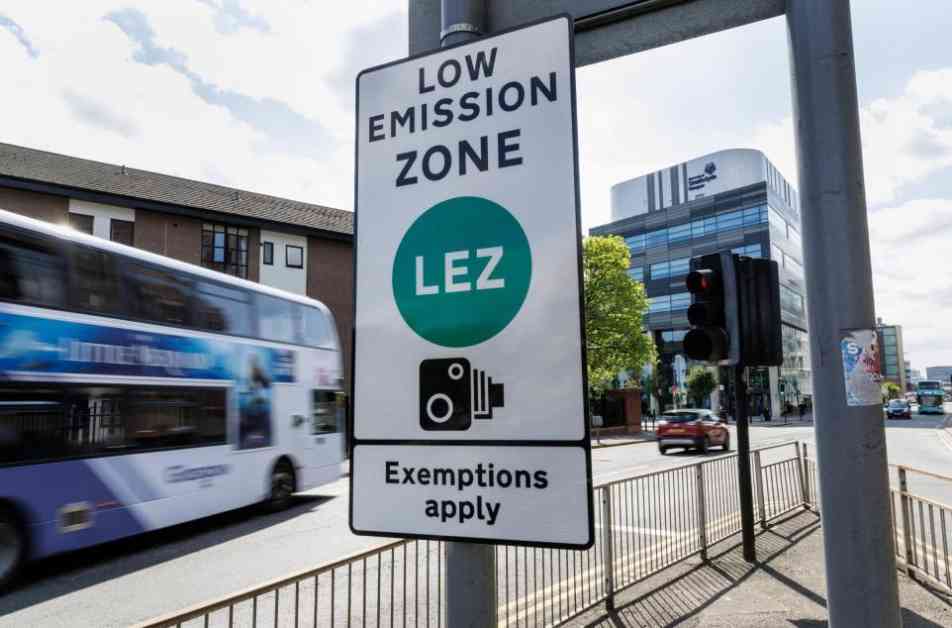Excuses from drivers for breaching the low emission rules in Glasgow have been varied and sometimes creative. From blaming their sat navs for leading them into the zone to claiming that the entire scheme is ‘unlawful’, motorists have come up with a range of justifications as they unsuccessfully appealed fines issued over the last year. These fines were issued after drivers were caught driving more polluting vehicles, which are banned in the Low Emission Zone (LEZ) streets of Glasgow.
Glasgow City Council recently revealed the reasons given by drivers in a report presented to the Net Zero and Climate Progress Monitoring City Policy Committee. Some of the common excuses included claims that their vehicles were actually compliant, that their cars were not actually in the LEZ, that they didn’t know about it, or even that they were not the registered keeper of the vehicle.
Up until March 31 this year, a total of 5,692 appeals against an LEZ penalty charge notice were received, with 1,765 of those appeals being successful, equivalent to 31 percent. As a result, a total of £11,520 was refunded following appeals and cancellations.
Situations where people were successful in getting penalty charges cancelled included cases where the recipients were blue badge holders and there was evidence that the vehicles were compliant, among other reasons. However, the meeting also revealed that drivers paid out nearly £1 million for LEZ penalty charge notices in Glasgow over the last year.
A total of 38,294 penalty charge notices were handed out, with the fines raking in £982,415 between June 1, 2023, and March 31 of this year. The total cost of the LEZ scheme rollout has been over £2.5 million, with £2.2 million of that coming from grant funding from the Scottish Government. The net revenue received by Glasgow City Council amounts to £747,511 for the first financial year of the scheme.
Glasgow’s Low Emission Zone Challenges
Commenting on the LEZ update at the council meeting, Councillor Keiran O’Neill from the Labour party expressed his thoughts on the challenges faced by the LEZ. He mentioned, “It is good to see this – I know there have been teething issues with the LEZ.” He also added, “I find it quite staggering how many people are getting repeated fines and how that is being pursued. How are we trying to address that behavior change?”
During the meeting, Councillor O’Neill also inquired about whether there was a particular type of vehicle associated with larger fines. Figures presented showed that there were 690 cases of people amassing fines of £960. An official responded by stating that the council will delve into the types of vehicles that are likely to be repeat offenders and will update Councillor O’Neill when the information becomes available.
Understanding the Low Emission Zone Scheme
The Low Emission Zone in Glasgow was established to improve air quality by restricting access to more polluting vehicles in certain areas of the city. The scheme aims to reduce harmful emissions and promote the use of cleaner, greener transportation options. Vehicles that do not meet the emission standards set by the LEZ are prohibited from entering the designated zones.
Drivers are required to adhere to the rules of the LEZ, which include ensuring that their vehicles meet the necessary emission standards. Failure to comply with these regulations can result in penalty charges being issued. The fines collected from these penalty charges contribute to the enforcement and maintenance of the LEZ scheme.
Addressing Excuses and Ensuring Compliance
While some drivers have provided legitimate reasons for breaching the LEZ rules, it is essential to address these excuses and ensure compliance with the emissions standards. Educating drivers about the requirements of the LEZ, providing clear signage and information, and implementing effective enforcement measures can help reduce the number of violations and improve overall compliance.
It is crucial for drivers to understand the importance of reducing emissions and the role they play in protecting the environment and public health. By promoting sustainable transportation options and incentivizing the use of cleaner vehicles, cities like Glasgow can work towards achieving their environmental goals and creating a healthier, more sustainable future for all residents.
In conclusion, the challenges faced by Glasgow’s Low Emission Zone highlight the complexities of implementing and enforcing emissions standards in urban areas. By addressing excuses, promoting compliance, and prioritizing sustainable transportation solutions, cities can effectively reduce pollution levels and improve air quality for all residents.















